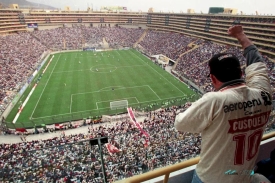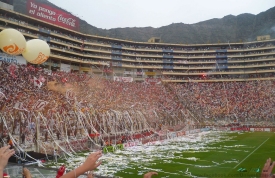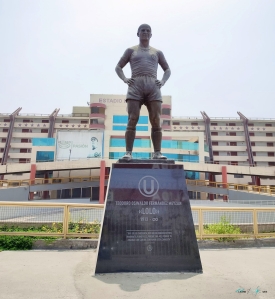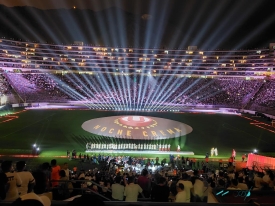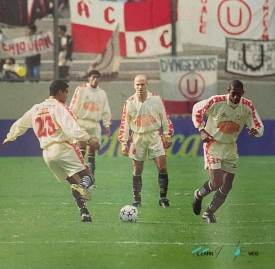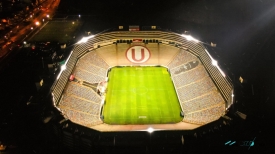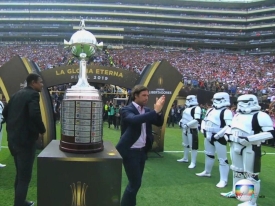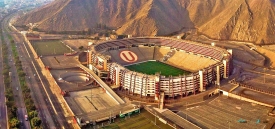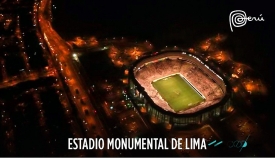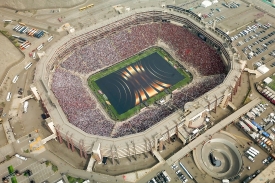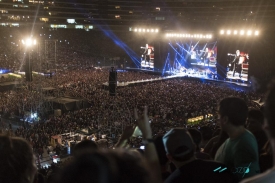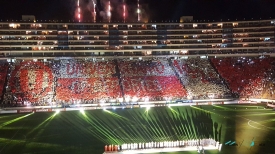Nestled in the heart of the bustling city of Lima, the University Sports Club's Monumental Stadium stands tall as a symbol of sporting achievement, history, and community spirit. With a rich legacy that dates back decades, this iconic arena has witnessed the rise of champions and become an integral part of Lima's cultural fabric.
Throughout its existence, the University Sports Club has consistently contributed to Peruvian sports history. Their soccer team, in particular, has garnered a loyal fanbase and achieved numerous titles, including multiple national championships and international recognitions. The club's commitment to excellence and its contributions to sports development have made it a beloved institution in Lima and beyond.
The construction of El Monumental began in 1996, marking a pivotal moment in the club's history. The architectural brilliance and attention to detail showcased in the stadium's design echoed the club's commitment to quality and innovation. With a seating capacity of 80000, the stadium could accommodate thousands of fervent fans, creating an electrifying atmosphere that heightened the spirit of every match.
The construction process itself was a remarkable journey, characterized by collaborative efforts from architects, engineers, and construction workers who poured their skills and dedication into the stadium's creation. The incorporation of modern amenities, state-of-the-art facilities, and sustainable design principles ensured that El Monumental would not only stand as a sporting arena but also as a hub of community engagement and events.
Uruguayan architect Walter Lavalleja Sarriés led the construction of the stadium.
Over the years, El Monumental has transcended its role as a sports arena to become a cherished cultural symbol. The stadium has played host to countless memorable matches, historic victories, and emotional moments that have etched themselves into the memories of fans and players alike.
Beyond sports events, El Monumental has welcomed a diverse range of concerts, cultural performances, and public events that have further solidified its status as a community gathering place. The stadium's presence is felt not just during matches, but throughout the year as it continues to be a hub of activity and celebration.
The Monumental Stadium hosted the 2019 Copa Libertadores Final, won by Flamengo against River Plate (2-1).
With each cheer from the stands, each victory on the pitch, and each memory shared within its walls, El Monumental perpetuates the legacy of the University Sports Club and continues to inspire generations to come.
In a city where sports and culture intersect, the Monumental Stadium stands tall, a monument not only to sports but to the indomitable spirit of Lima itself.
A Brief History of the University Sports Club
The University Sports Club, commonly known as "Club Universitario de Deportes," holds a storied past that traces its origins to 1924. Founded by a group of visionary students from the National University of San Marcos, the club aimed to promote sports among the university's community while fostering a sense of camaraderie and unity.Throughout its existence, the University Sports Club has consistently contributed to Peruvian sports history. Their soccer team, in particular, has garnered a loyal fanbase and achieved numerous titles, including multiple national championships and international recognitions. The club's commitment to excellence and its contributions to sports development have made it a beloved institution in Lima and beyond.
Monumental Stadium: A Colossal Feat of Architecture
The Monumental Stadium, affectionately dubbed "El Monumental," emerged as the University Sports Club's crowning jewel. The visionary idea of having a grand arena for sports events and community gatherings led to the conception of this monumental project.The construction of El Monumental began in 1996, marking a pivotal moment in the club's history. The architectural brilliance and attention to detail showcased in the stadium's design echoed the club's commitment to quality and innovation. With a seating capacity of 80000, the stadium could accommodate thousands of fervent fans, creating an electrifying atmosphere that heightened the spirit of every match.
The construction process itself was a remarkable journey, characterized by collaborative efforts from architects, engineers, and construction workers who poured their skills and dedication into the stadium's creation. The incorporation of modern amenities, state-of-the-art facilities, and sustainable design principles ensured that El Monumental would not only stand as a sporting arena but also as a hub of community engagement and events.
Uruguayan architect Walter Lavalleja Sarriés led the construction of the stadium.
A Cultural Icon and Gathering Place
Singers and rock groups such as Roger Waters, The Rolling Stones, Guns N' Roses and Paul McCartney have performed at the stadium.Over the years, El Monumental has transcended its role as a sports arena to become a cherished cultural symbol. The stadium has played host to countless memorable matches, historic victories, and emotional moments that have etched themselves into the memories of fans and players alike.
Beyond sports events, El Monumental has welcomed a diverse range of concerts, cultural performances, and public events that have further solidified its status as a community gathering place. The stadium's presence is felt not just during matches, but throughout the year as it continues to be a hub of activity and celebration.
The Monumental Stadium hosted the 2019 Copa Libertadores Final, won by Flamengo against River Plate (2-1).
Looking Ahead: The Legacy Continues
As the University Sports Club's Monumental Stadium continues to stand proudly in Lima, it serves as a testament to the enduring spirit of sportsmanship, unity, and excellence. The club's journey from its humble beginnings to the construction of this architectural marvel is a story of passion, dedication, and a commitment to fostering a sense of belonging within the community.With each cheer from the stands, each victory on the pitch, and each memory shared within its walls, El Monumental perpetuates the legacy of the University Sports Club and continues to inspire generations to come.
In a city where sports and culture intersect, the Monumental Stadium stands tall, a monument not only to sports but to the indomitable spirit of Lima itself.





